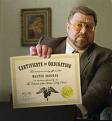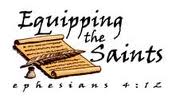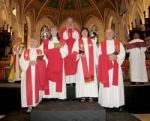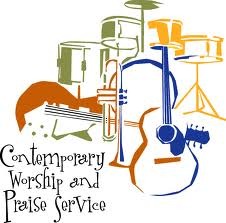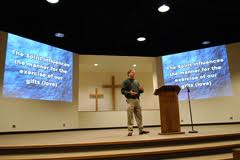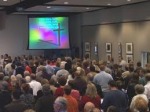Different Prints But The Same On The Hand Of God
 Throughout my life I have been asked, “Have you felt the hand of God on you, son?” by Church fathers? Physically, not really; spiritually, definitively! Well, if his hand has been on me, and we take those fingerprints to a lab to test them, what would we find? We might find each finger to be uniquely different, yet dramatically the same.
Throughout my life I have been asked, “Have you felt the hand of God on you, son?” by Church fathers? Physically, not really; spiritually, definitively! Well, if his hand has been on me, and we take those fingerprints to a lab to test them, what would we find? We might find each finger to be uniquely different, yet dramatically the same.
 One finger may have the print of a passion, gifting, or point of view that sees the world as being lost, hurting, needing a Savior, and has the passion to proclaim the message of salvation, redemption, reconciliation, grace, mercy forgiveness, etc. to everyone and anyone who does not know Jesus. It would also be a print of birth and rebirth, a desire to start a new by turning from old ways only to embrace new ones. We call that the evangelistic spirit, but upon closer examination of that fingerprint, all we would see is the fingerprint of Jesus.
One finger may have the print of a passion, gifting, or point of view that sees the world as being lost, hurting, needing a Savior, and has the passion to proclaim the message of salvation, redemption, reconciliation, grace, mercy forgiveness, etc. to everyone and anyone who does not know Jesus. It would also be a print of birth and rebirth, a desire to start a new by turning from old ways only to embrace new ones. We call that the evangelistic spirit, but upon closer examination of that fingerprint, all we would see is the fingerprint of Jesus.
 The next finger may have the print of a passion, gifting, or point of view that sees a hurting world but is driven to give comfort and care to those hurting. It may also see other believers as needing to be nurtured in their every day walk and faith journey towards maturing into the fullness of Jesus Christ. We call that the pastoral shepherding spirit, but upon closer examination of that fingerprint, all we would see is the fingerprint of Jesus.
The next finger may have the print of a passion, gifting, or point of view that sees a hurting world but is driven to give comfort and care to those hurting. It may also see other believers as needing to be nurtured in their every day walk and faith journey towards maturing into the fullness of Jesus Christ. We call that the pastoral shepherding spirit, but upon closer examination of that fingerprint, all we would see is the fingerprint of Jesus.
 Another finger would have the print of a passion, gifting, or point of view that sees the world only through the Logos Word, the written Word of God, the Bible, desiring to imprint and embed the written scripture in the heart and spirit of every believer and nonbeliever. His desire is for every believer to worship in “spirit and in truth.” Grounded in the “truth” of the written word, the Logos Word, he would want to release the “spirit” of that Word into a living, active, experiential Rhema Word. We call that the pastoral teaching spirit, but upon closer examination of that fingerprint, all we would see is the fingerprint of Jesus.
Another finger would have the print of a passion, gifting, or point of view that sees the world only through the Logos Word, the written Word of God, the Bible, desiring to imprint and embed the written scripture in the heart and spirit of every believer and nonbeliever. His desire is for every believer to worship in “spirit and in truth.” Grounded in the “truth” of the written word, the Logos Word, he would want to release the “spirit” of that Word into a living, active, experiential Rhema Word. We call that the pastoral teaching spirit, but upon closer examination of that fingerprint, all we would see is the fingerprint of Jesus.
 Another finger would have the print of a passion, gifting, or point of view that sees the world needing to commune with God. Built upon the evangelist having man bridge the gulf of his relationship with God through salvation while being nurtured through pastoral shepherding and grounded on the Word of God through the teacher, this fingerprint would want each believer to be in the right relationship as a believer with the God whose fingerprints are on their life. We call that the prophetic spirit, but upon closer examination of that fingerprint, all we would see is the fingerprint of Jesus.
Another finger would have the print of a passion, gifting, or point of view that sees the world needing to commune with God. Built upon the evangelist having man bridge the gulf of his relationship with God through salvation while being nurtured through pastoral shepherding and grounded on the Word of God through the teacher, this fingerprint would want each believer to be in the right relationship as a believer with the God whose fingerprints are on their life. We call that the prophetic spirit, but upon closer examination of that fingerprint, all we would see is the fingerprint of Jesus.
 Another finger would have the print of a passion, gifting, or point of view that sees the Church as a whole. It’s individual print would be complicated because it would have the pattern of an evangelist, pastoral shepherd, a teacher, and a prophet, yet a distinct print of its own, for it could see all the distinctive prints in its own, yet the beauty all the prints united together for the maturity of individual believers in the image of Jesus and corporately for the Body of Christ. We call that the pastoral apostolic spirit, but upon closer examination of that fingerprint, all we would see is the fingerprint of Jesus.
Another finger would have the print of a passion, gifting, or point of view that sees the Church as a whole. It’s individual print would be complicated because it would have the pattern of an evangelist, pastoral shepherd, a teacher, and a prophet, yet a distinct print of its own, for it could see all the distinctive prints in its own, yet the beauty all the prints united together for the maturity of individual believers in the image of Jesus and corporately for the Body of Christ. We call that the pastoral apostolic spirit, but upon closer examination of that fingerprint, all we would see is the fingerprint of Jesus.
So which finger is the pointer finger, the finger pointing the way? It could be any of the five: the evangelistic finger pointing the lost to be found, the pastoral shepherd finger pointing nurture and care to the hurting and development and growth to believers, the teaching finger pointing our chapter and verse scripturally in the Bible instructing one how to live it out daily, or even the prophetic finger pointing always pointing to Jesus in everything the believer does, or even the apostolic finger which is like a thumb, resting on top of the other four fingers but whose job is to make the hand “grasp” or hold on to something only through the use of all five fingers.
Which is the ring finger? Traditionally the wedding ring is placed on the fourth finger, but again it could be placed on any one of the five fingers because each one individually works in conjunction with the other four by being served by and serving the other four. This brings accountability and unity to the entire hand. Each of them is instrumental in making and preparing corporately the “Bride of Christ”, The Church. Each has a function that brings “oneness” that only marriage can to diversely different people.
 If we are made in the likeness of God, as I have been taught in Church all my life, then in child like faith I can assume he has five fingers on his hand. Those five fingers could have the pattern and print of an evangelist, pastoral shepherd, teacher, prophet, or apostle on them, yet upon closer examination they are all the same for their print is the print of Jesus.
If we are made in the likeness of God, as I have been taught in Church all my life, then in child like faith I can assume he has five fingers on his hand. Those five fingers could have the pattern and print of an evangelist, pastoral shepherd, teacher, prophet, or apostle on them, yet upon closer examination they are all the same for their print is the print of Jesus.







